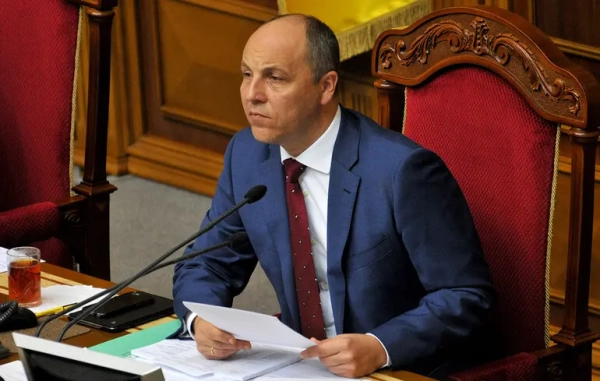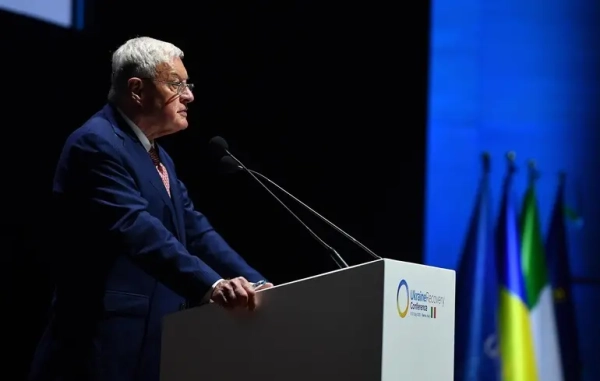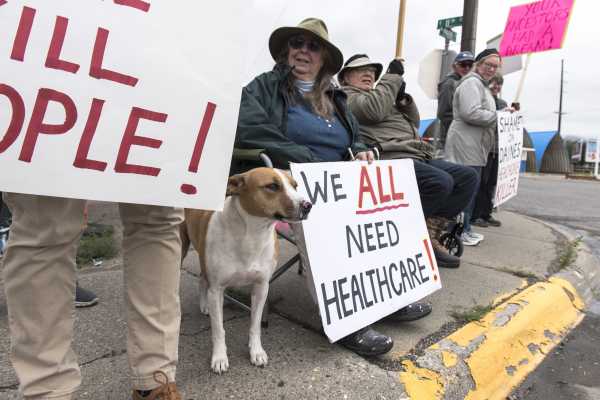
A new Marist poll testing the popularity of a bunch of progressive ideas leads to a slightly tedious truth: Some are popular and some are not popular, and there’s not much of a pattern determining which are which.
The latest progressive activist fad on immigration policy, changing unauthorized entry from a criminal to a civil offense, for example, is badly underwater. But the old progressive standby of offering a path to citizenship for millions of undocumented residents of the United States polls very well. Massive investment in clean energy polls very well, but taxing dirty energy is much less popular. Free college is in between.
These findings have led to a bit of a feud on the left over where the Democratic base really falls ideologically. Kevin Drum, a veteran liberal blogger concluded that “liberal ideas are not as popular as you think.”
But Mike Casca, a former spokesperson for Keith Ellison, Bill de Blasio, and Bernie Sanders, exulted over the results. (He’s now a founding partner of MVMT Communications, a self-consciously leftist political strategy shop that proclaims its mission to be “primarying the consultant class.”)
“The progressive agenda is popular, my friends” was his takeaway.
Democrats aren’t talking about a third conclusion: Most voters are not particularly attuned to factional debates, and they just like some ideas and not others. Rather than clinging to one or the other comprehensive agenda, Democrats might want to consider opening themselves up to the idea of just running on popular ideas.
Some left-wing stuff is popular, some isn’t
Marist’s numbers, for reference, show overwhelming public support for a path to citizenship for the undocumented population, for an aggressive public option approach to universal health care, and for a “Green New Deal” of public investment in clean energy and efficient retrofits. Add that to a $15/hour minimum wage, throw in two high-polling gun control measures, legalize marijuana, and pay for the first two things with a wealth tax, and you’ve got a solidly popular vision for transforming America.
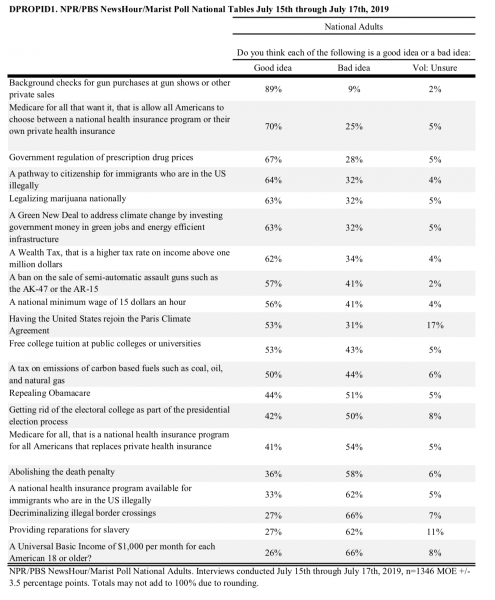
But even though these ideas are popular and progressive, it doesn’t follow that the entire progressive agenda is popular.
Insisting on a pure single-payer solution, which many on the left has turned into a litmus test, doesn’t seem very popular. Opening up public sector health programs to people residing in the United States illegally — an idea every Democrat endorsed on the second night of the first primary debates — is very unpopular. So is decriminalizing border crossing and providing reparations for slavery. Abolishing the death penalty, which electability-oriented moderate Joe Biden came out for this week, polls very poorly. A carbon tax does not do very well either.
This is not unique to the Marist poll. The left-wing think tank Data for Progress has been sporadically releasing polling on the progressive agenda, and the findings are simply hard to guess from first principles.
A proposal to add worker representatives to corporate boards would both substantially change the nature of the American economy and polls extremely well, while a fairly modest proposal to spend more money on building subsidized housing units is not that popular. The widely discussed idea of free college, in their data, has middling support, but a paid family leave program — which seems to have fallen off the radar in recent months — is overwhelmingly popular.
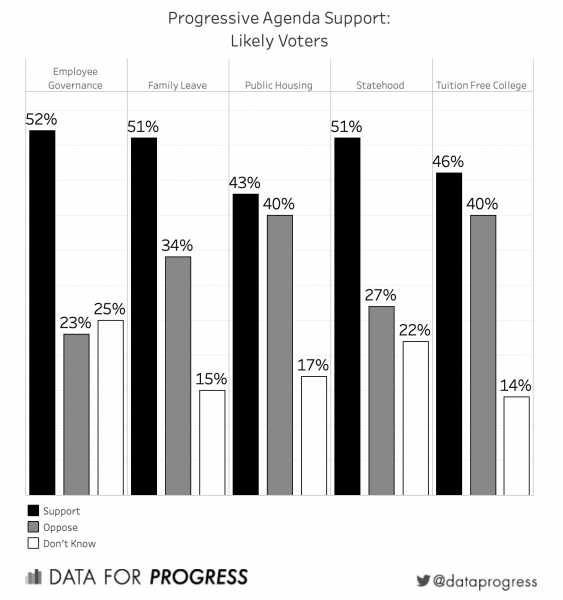
I’m not really sure what to say about this, except that it underscores a classic political science finding: Most people are not very ideological in the way that people who like to yell about politics on the internet are.
That’s what Philip Converse found decades ago in The Nature of Belief Systems in Mass Publics and it’s reconfirmed in a more recent book by Donald Kinder and Nathan Kalmoe titled Neither Liberal Nor Conservative: Ideological Innocence in the American Public. People have opinions on issues, but most people’s partisan allegiances are anchored in group identity, and their issue preferences are a little scattered and disorganized. That means thinking of political positioning in terms of broad factional alignments is going to be a recipe for confusion.
It’s neither the case that the moderates’ agenda is uniformly popular nor that more progressive Democrats’ agenda is uniformly popular. There’s just a bunch of stuff, some of which is popular and some of which isn’t. And to the extent that issues matter at all in politics — a modest, but non-zero extent according to most accounts — the smart thing is just to pick the popular stuff. After all, it’s a pretty expansive agenda.
Presidents only get a few things done
Barack Obama passed a major stimulus bill, a big health care bill, and a major overhaul of the nation’s financial regulatory system.
That left progressives disappointed with legislative inaction on a number of important topics, including most critically climate change and immigration. But it turns out Obama’s passage of three big bills is pretty impressive in comparative context. Donald Trump, for example, got a big tax cut, and that’s about it. George W. Bush did two big tax cuts and a Medicare expansion. Bill Clinton had NAFTA, a deficit-reduction bill, and the omnibus crime bill. All these presidents did other important things, of course — foreign policy, judicial appointments, control over the bureaucracy — but the record of major partisan legislation suggests there are some real limits.
That’s no reason to avoid running on 17 substantively solid, politically popular ideas if you’ve got them. But if it turns out you only have nine, that’s not so bad. Odds are that nine is a lot more than you can do.
Which is to say that there’s no reason practically to insist on weighing down the ticket with ideas (“free health care for illegal immigrants”) that won’t pass anyway, Democrats could focus on a narrower list of progressive ideas that are popular (a path to citizenship for the undocumented would, among other things, help them get health care) win the election, and then implement those ideas.
Democrats would have to let go of some cherished ideological nostrums (like reparations) and party feuds (like over abolishing private insurance). But the strictly popular items on the list are a genuinely ambitious progressive agenda that would, if implemented, help improve the lives of hundreds of millions of Americans. And the stakes are extremely high.
Democrats need to beat a skewed map
The biggest problem Democrats face right now is a skewed electoral geography. They likely need to win the popular vote by 3 to 5 points to win the presidency. A series of gerrymanders requires a similar margin in the US House and a bigger one in state legislatures, and the Senate map is almost comically skewed against Democrats.
But the path to a Democratic Senate in 2020, though narrow, is reasonably clear. Democrats need to win in Arizona and Colorado, and then two states out of the reach set of Maine, Iowa, North Carolina, Texas, Alabama, and Georgia. That’s hard, but it’s not inconceivable with a big landslide win.
A landslide win would also give Democrats a larger say in the post-2020 redistricting process, allowing them to craft less-biased House maps. And if Democrats held even a slim majority in the Senate, they could use it to admit DC and Puerto Rico as states to help reduce the skew of the map. They could also press forward with ideas like automatic voter registration that would reduce the demographic skews in the electorate.
To do any of that, though, Democrats would need to win first. And not just any win — a big win that takes advantage of Trump’s unpopularity to not just eke out an Electoral College win but crush him and drive enough down-ballot gains to let Democrats actually legislate.
The worry that committing to unpopular ideas will somehow guarantee Trump’s reelection is silly (he has lots of unpopular ideas of his own). But what is true is that popular ideas are better than unpopular ones for winning votes, and precisely because many progressive ideas are popular, there’s no good reason to let the unpopular ones drag them down.
Sourse: vox.com

